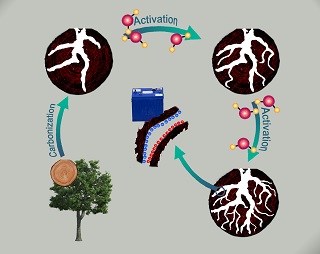

离子液体电解质种类对活性炭电极超级电容器电化学性能的影响
收稿日期: 2016-12-15
修回日期: 2017-03-01
网络出版日期: 2017-03-01
基金资助
林业公益性行业科研专项(No. 201404611)及教育部博士点博导基金(No. 20133204110007)资助
Engineering the Electrochemical Capacitive Properties of Activated Carbon by Correct Selection of Ionic-Liquid Electrolytes
Received date: 2016-12-15
Revised date: 2017-03-01
Online published: 2017-03-01
本文将经水蒸气二次活化的椰壳活性炭(W-AC)作为电极材料,选择1-乙基-3甲基咪唑四氟硼酸盐([EMIM]BF4)作为电解质,结果表明W-AC电极的比电容量远高于未活化的椰壳活性炭(R-AC). 使用循环伏安、恒电流充放电、交流阻抗等方法研究了不同种类离子液体电解质对超级电容器电化学性能的影响. 不同阴阳离子组成的离子液体作为电解质,直接影响超级电容器的电化学性能. 研究表明,由EMIM+和BMIM+阳离子与BF4-、TFSI-阴离子构成的离子液体电解质较适用于W-AC电极. 其中在[EMIM]BF4电解质中,单片电极的比电容量可高达153 F·g-1;在1-丁基-3-甲基-咪唑四氟硼酸盐([BMIM]BF4)电解质中电位窗可达3.5V,能量密度可高达57 Wh·kg-1. 本研究对于构筑高性能超级电容器离子液体的选择提供参考,以满足不同应用领域需求.

张秋红 , 申保收 , 左宋林 , 卫歆雨 . 离子液体电解质种类对活性炭电极超级电容器电化学性能的影响[J]. 电化学, 2017 , 23(6) : 684 -693 . DOI: 10.13208/j.electrochem.161215

/
| 〈 |
|
〉 |